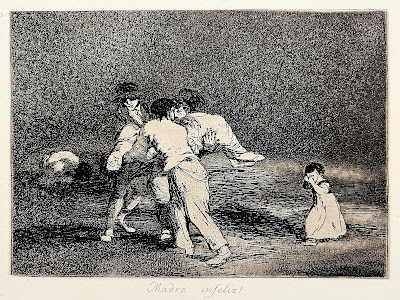Looking through my photos, a series fell into my hands that I made in April
while visiting the Georgia O'Keefe exhibition in Basel. These are etchings by Francisco de Goya, exhibited in the museum's vestibule because of the Ukraine war?

|
|
Esto es peor (This is worse) A man, his anus impaled on a branch stump. |
Indeed. In an introductory text written in English, the museum wrote:
The selection of prints presented here from Goya's Desastres de la guerra is a testament against violence and war in light of the invasion of the Ukraine by the Russian military.

|
|
Que hai que hacer mas? (What more can be done?) Remember Bond's nearly castration in Goldfinger? |
The May 2, 1808 (Dos de Mayo) uprisings in Madrid against the French
occupation forces are considered the beginning of armed resistance.

|
| Bárbaros! (Barbarians) |
This developed into the first guerrilla war in modern history, which both
sides waged with extreme cruelty.

|
| Lo merecia (He deserved it) |
The failure of the guerrillas to keep a red line between civilians and
combatants led to a high level of violence against civilians on the part of
regular French troops.

|
|
Lo mismo (The same) A desperate Spanish retaliation. |

|
|
How the scenes resemble each other. Peasants slay a horseman in the Thirty Years' War. A contemporary engraving by Hans Ulrich Franck |
Again and again, rapes:

|
| Amarga presencia (Bitter to be present) |

|
|
No quieren (They don't want to) You are not going to rape my daughter |


No comments:
Post a Comment